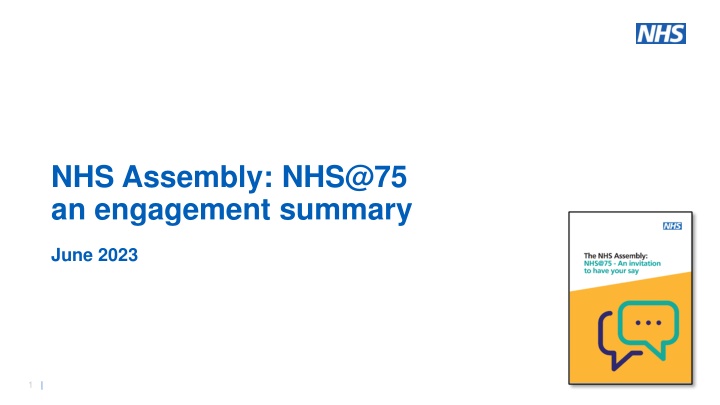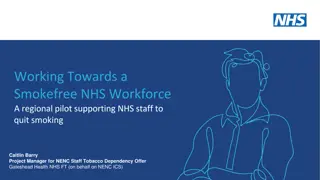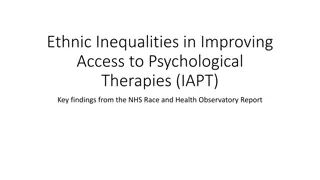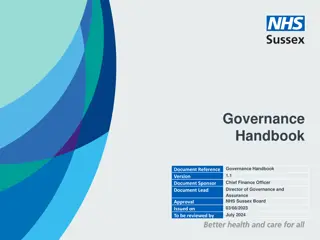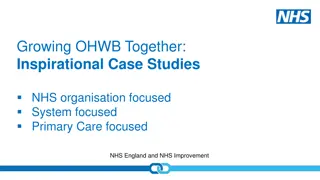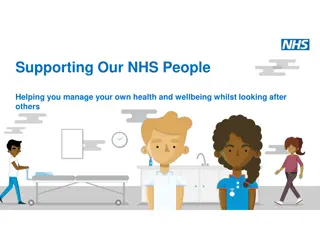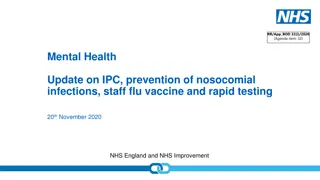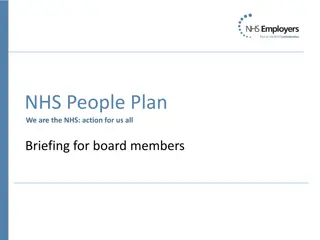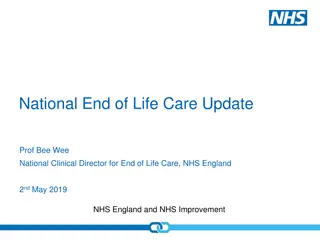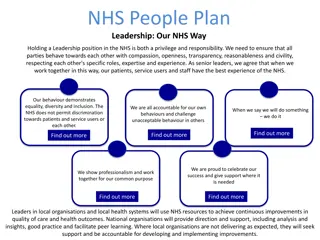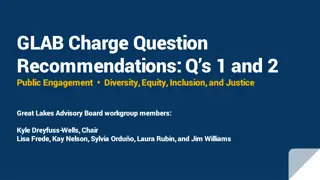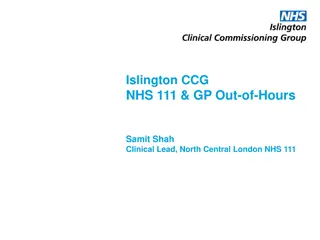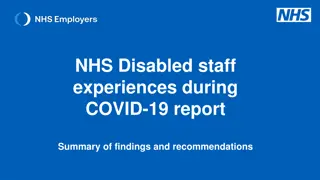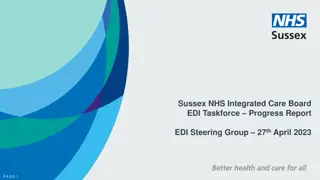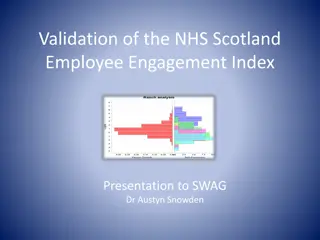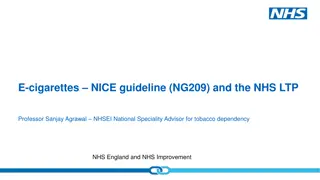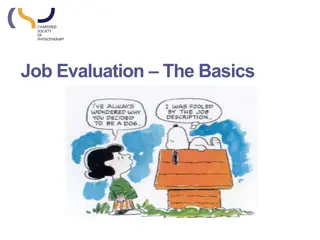NHS@75 Engagement Summary: Reflections and Recommendations
The NHS Assembly's engagement process for NHS@75 involved gathering insights from various stakeholders on the strengths, areas for improvement, and future opportunities of the NHS. Through surveys, conversations, and consultations, a consensus emerged on celebrating universal values, improving access and communication, prioritizing prevention, and enhancing collaboration with communities. The report highlights key themes such as staff dedication, technological advancements, and the need for better service integration to shape the future of healthcare delivery.
Download Presentation

Please find below an Image/Link to download the presentation.
The content on the website is provided AS IS for your information and personal use only. It may not be sold, licensed, or shared on other websites without obtaining consent from the author.If you encounter any issues during the download, it is possible that the publisher has removed the file from their server.
You are allowed to download the files provided on this website for personal or commercial use, subject to the condition that they are used lawfully. All files are the property of their respective owners.
The content on the website is provided AS IS for your information and personal use only. It may not be sold, licensed, or shared on other websites without obtaining consent from the author.
E N D
Presentation Transcript
NHS Assembly: NHS@75 an engagement summary June 2023 1 |
Contents Context The NHS Assembly 1. Overview of the NHS@75 and the engagement process The NHS Assembly brings together individuals from across the health and care sectors at regular intervals to provide independent advice to the board of NHS England. 2. The most common themes raised in the engagement 3. Engagement summary by question: Q1 - What should we celebrate about the NHS? Q2 - Where is the NHS making progress? Q3 - Where does the NHS need to improve? Q4 - What are the most important lessons we have learnt? Q5 - How should we change the way we deliver care? Q6 - What needs to be in place to meet these ambitions? Its members include NHS clinical and operational leaders, frontline staff, patients and carers, and representatives from charities and community organisations. Introducing NHS@75 Annex: Overview of methodology for analysing Citizen Space On 5 July 2023, the NHS celebrates its 75th birthday. Ahead of this, the NHS Assembly has been asking people for their thoughts on the NHS and its future. This report provides a summary of the analysis of these discussions to inform and shape the NHS Assembly s NHS@75 report.
Overview of the process undertaken The NHS@75 rapid engagement process launched across NHS networks on 3 May 2023, with a survey and conversation guide asking for views. We are very grateful to all who contributed to this process. By the end of May, we had: Received almost 700 responses via the Citizen Space portal, with around 200 from organisations and around 500 from individuals. These were reviewed question by question and a coding process was used to highlight common themes in the responses. All organisational responses and 200 individual responses were coded (at which point the themes were clear). As the organisational responses often represented group discussions, the Citizen Space responses reflect the views of several thousand people. Organised engagement sessions to gain lived experience patient and carer insights including with Carers UK, the Patients Association, National Voices, Older Peoples Sounding Board, the NHS Citizen Advisory Group, and Learning Disability and Autism Advisory Group (we extended the deadline for our easy read survey). Conducted over 50 conversations with NHS trust and ICB chief executives, usually informed by staff discussions. Engaged directly with clinical leaders through virtual roundtables in partnership with NHS England s professional leaders, national clinical directors and specialty advisers. Commissioned insights work with Healthwatch England, National Voices, the Patients Association, the NHS staff survey team and the Race Equality Foundation, with accessible and translated materials provided. This report provides a summary of the responses from this engagement, consolidating messages from the different strands of work. The analysis has been undertaken relatively rapidly and the NHS Assembly and NHS England will continue to draw on the detailed feedback in the months ahead.
Across our engagement, there was a general consensus around the strengths, areas for improvement and most important shifts required for the NHS Strengths and things to celebrate Areas for improvement Opportunities and shifts for the future Benefits of universal values; care for all, free at point of delivery Improving access, by reducing waiting times and improving ease of navigation and communication Prioritising prevention and providing support and education to stay healthy Putting people at the centre of decision making Working in partnership with people, communities and the VCSE sector to deliver Dedication, kindness and diversity of our staff Improvements brought about by digital, tech and innovations over 75 years Improving interoperability and integration between services Harnessing digital tools to empower, educate and communicate with patients Progress in providing more integrated care and collaborating beyond the NHS Moving care to people s homes and communities wherever possible Better support for staff and improving the culture within NHS Providing increasingly patient centric care Making greater use of community assets*, particularly to address health inequalities Ensuring appropriate resource and autonomy for systems to learn, improve and embed change The huge importance of effective social and community care has been even further highlighted during COVID and afterwards [The NHS must improve] caring for its own frontline staff, including all the ancillary staff. the NHS is beginning to break through on issues like patient doctor shared decision making but it still has a mountain to climb Universal access to free healthcare is HUGE and still to be celebrated and protected. Virtual wards - a new venture and brilliant way to modernise and expand care. The NHS has great resilience, shown in Covid-19 when staff thought creatively around problems they are facing. Staff rarely give up! Earlier diagnosis means better outcomes for the patient. Without this, someone may become disabled, needing costly care and have more need for psychological support too. 4 | * Community assets are anything that can be used to improve the quality of community life. They can be physical facilities, organisations, associations, or individuals. They can provide services, support, or activities that promote social inclusion, health, and wellbeing. Voluntary, community and social enterprise
Q1: Citizen Space feedback on what should we celebrate about the NHS? Citizen Space survey responses highlight: Top five themes* 50% Both organisational and individual responses from members of the public and staff agree that the NHS has multiple major achievements to celebrate for its 75th birthday. In both the individual and organisational responses, the top two themes were: 45% 40% 40% Change and innovation - 56% 30% 24% the NHS s founding principles (specifically that it is free at point of access and care is provided for all) that have helped to raise the average life expectancy and tackle inequalities, though more work is needed on this. 17% 20% 15% 10% the dedication and kindness of the workforce. Importantly, since Windrush, NHS staff have been reflective of the communities they serve and the NHS continues to attract, train and develop talent from across the globe. 0% Research and Innovation Clinical Outcomes New Models of Care Universal NHS Values NHS Workforce Research and innovation; clinical outcomes, and new models of care were also in the top five themes, with a further 12% of responses mentioning the sixth top theme of digital and technology : The NHS s integrated and collaborative approach to delivering healthcare, both internally and with external partners, resulting in more joined-up services for patients. This was a particular focus of organisational respondents. Opportunities and improvements brought about by digital, data, tech and innovations in medicine, including virtual wards, AI-assisted diagnostic, robotic surgery, and genomics. Innovations in clinical care, such as the identification and treatment of cancer, support for cardiovascular conditions and innovations in diabetes care. Individuals and staff particularly focused on cancer care and their personal journeys. * Based on all organisational responses and a large sample of individual responses. A single response can be aligned with more than one theme category i.e. if a number of themes featured in a single organisational or individual response to a question, each theme category was separately coded. See Annex for more detail. New Models of Care includes sub-categories such as pandemic response, virtual wards and pathway redesign
Q1: Other feedback on what should we celebrate about the NHS? We commissioned partners including Healthwatch, National Voices and the Patients Association to conduct engagement. We also interviewed health and care leaders and clinicians, participated in Assembly break-out discussions, and sought insights from NHS England s engagement and Patient and Public Voice networks. Common key themes include: Citizens and stakeholders agree that public support for universal healthcare free to all remains strong. Almost the entire population is registered with a GP, which is unusual even in some comparable countries. We should celebrate our workforce. We have long since benefited from the support of diverse and hard-working NHS staff. The kindness and compassion of NHS staff is of particular credit, reinforced by the Patients Association winter survey. Other notable points from wider feedback include: The NHS has a notable ability to adapt . Its story is not only one of continuity, but also of radical change. The closure of long stay institutions was cited by several NHS leaders as an example of this. Clinical leaders have credited the NHS with the effective translation of research into clinical practice. Frontline staff have shared that despite ongoing challenges and disputes, the NHS provides a great career path that engenders pride and purpose. Our clinical engagement workstream recognised the speed of the NHS coming together and working to tackle COVID. Such a strong collective endeavour might be attributed in part to the NHS model. Patient engagement also indicated patients thought we should celebrate the COVID-19 vaccination rollout. Goodwill towards the NHS remains strong. National Voices has found that small charities and patients want to give back, and want the service to improve.
Q1: What should we celebrate about the NHS? Typical quotes from engagement There was no NHS when I was born in 1946. Me and my wife are alive today because of NHS operations Advancements in the treatment of cancer, the ability to tailor these to the individual and provide the best standard of care through personalised medicines. These will be the future of the NHS Staff in all roles deliver over and above Universal access to free healthcare is HUGE and still to be celebrated and protected The NHS is a genuinely inclusive institution with a diverse workforce which should be celebrated We should celebrate the NHS link with research and academia in terms of single system illness and disease. The care that people need in terms of this must be second to none when considered internationally The fact that everyone gets the same care is astonishing and the mark of a civilised society Listening to the patient and involving them more in their care where appropriate Primary Care is the jewel in the crown
Q2: Citizen Space feedback on where is the NHS making progress? Citizen Space survey responses highlight: Digital and technology featured as an area of progress. Both individual and organisational responses agreed that research, innovation and genomics were key areas of improvement, leading to new treatments and procedures being developed to improve patient care and new technologies being introduced to make treatments safer and more effective. Many responses discussed how clinical outcomes had improved significantly due to medical advances and many focused particularly on cancer survival. NHS Workforce Several respondents felt that innovative practice in how clinical staff work and/or working in different services was improving patient care. Organisational responses highlighted integration and partnership working as a key area of progress, while individuals were more likely to mention prevention and public health, as well as new models of care, such as virtual wards and the pandemic response. Furthermore, organisations said that the NHS had improved the ways in which it supported staff, particularly in development and equality, diversity and inclusion. Individuals raised how primary care was using technology in innovative ways to improve access to care and allow patients and staff access to healthcare data. It is important to note that some individual respondents noted that they did not feel the NHS was making progress or caveated positive responses with a recognition that the NHS still had a long way to go. *Based on all organisational responses and a large sample of individual responses. A single response can be aligned with more than one theme category i.e. if a number of themes featured in a single organisational or individual response to a question, each theme category was separately coded. See Annex for more detail.
Q2: Other feedback: Where is the NHS making progress? We commissioned partners including Healthwatch, National Voices and the Patients Association to conduct engagement. We also interviewed health and care leaders and clinicians, participated in Assembly break-out discussions, and sought insights from NHS England s engagement and Patient and Public Voice (PPV) networks. Common key themes include: The NHS has got better at focusing on the whole person, with a greater emphasis on social prescribing and wellbeing. National Voices participants welcomed the aspiration to go further here. The NHS is starting to plan in a more integrated way, including at a local level. Other notable points from wider feedback include: The Patients Association concluded that there are grounds for cautious optimism that the NHS is making progress in implementing the principles of patient participation. Similarly, Carers UK noted the NHS is increasing its efforts to support unpaid carers. The NHS staff survey now identifies carers, and there have been steps forward in including carers in decision making, including on strategic matters. Some patients noted benefits from the NHS offering greater flexibility eg a choice between face-to-face or virtual appointments. Our clinical engagement workstream found an emerging view that an increasing level of effort is going into promoting clinical leadership and leadership development. The NHS has become a better place to work in some respects (eg flexible working) but could go further. Upskilling and developing our skills mix has the potential to improve care. An area of progress and potential is in partnership working, including with local authorities and the VCSE sector.
Q2: Where is the NHS making progress? Typical quotes from engagement My recovery started when my clinician asked me what I really wanted The use of communication technology has improved immensely, especially after the pandemic. Remote consultation and meetings via Zoom and Teams have revolutionised the way business is conducted in the NHS. Diagnostic technology has also improved dramatically the NHS is beginning to break through on issues like patient doctor shared decision making but it still has a mountain to climb The NHS has great resilience, shown in Covid-19 when staff thought creatively around problems they are facing Moving towards a more preventative way of thinking, but still more work to do We have got much better at ensuring patient safety is an absolute priority The NHS has improved at listening to people, but I know that s been especially hard during the pandemic We ve come on leaps and bounds on mental health since I started work, but there s always more to do Cancer used to be a death sentence but many people who have been treated by the NHS are thriving
Q3: Citizen Space feedback on where does the NHS need to improve? Responses focused heavily on the need to better support and retain staff, alongside how to best grow the workforce and make best use of skills, to give patients access to the right person at the right time. The need to improve organisational culture, including addressing bullying, harassment and poor morale. Reducing bureaucracy for clinical staff and improving interoperability of systems and processes across the NHS would make handovers between services more efficient and improve patient experience. NHS Workforce Technology as a means of improving access, and ensuring providers addressed digital exclusion. The need to improve primary care, including the importance of improving access(particularly GPs and dentists), communication about how to access care and about ongoing care and the need to relieve pressure, particularly on emergency care and mental health services. Organisational responses were more likely to state there is further need to improve integration within the healthcare system and with external partners, such as with local government, life sciences and the VCSE sector. Within the NHS, areas in primary and secondary care were highlighted as needing to improve as interdependency with other services was creating pressure. Individual responses were more likely than organisational ones to raise concerns that hospital waiting lists and bed capacity were affecting care and outcomes. *Based on all organisational responses and a large sample of individual responses. A single response can be aligned with more than one theme category i.e. if a number of themes featured in a single organisational or individual response to a question, each theme category was separately coded. See Annex for more detail. .
Q3: Other feedback on where does the NHS need to improve? We commissioned partners including Healthwatch, National Voices and Patients Association to conduct engagement. We also interviewed health and care leaders and clinicians, participated in Assembly break-out discussions, and sought insights from NHS England s engagement and PPV networks. Common key themes include: There is further work to be done in ensuring the NHS gets the basics right and offers an accessible, joined up service, supported by good communication. Primary and community care both need further development and potentially investment. Enabling people to make their own decisions about how to lead healthy lives and manage health conditions. Other notable points from wider feedback include: Carers UK would like the NHS to recognise the role of, and better support, unpaid and informal carers. Healthwatch, National Voices, and the Patients Association all reiterate the importance of getting the basics right. Patients struggle to gain access, stay on top of their appointments, or find the front door which risks exacerbating health inequalities. Patients should be possibly given chance to track their referrals. Smaller VCSE organisations, when convened by National Voices, expressed a view that the NHS does not always work well with them. They can offer support to patients, but they are often left outside of the room and struggle to influence policy or share their insights, which risks becoming ever more difficult when commissioning at an ICB level. There is a risk of a postcode lottery or increasing divergence. Insufficient attention is being placed on this as we move towards ICB working. NHS ICB and provider leaders sometimes thought we had over-specialised our medical workforce and thought that we should focus on retaining experienced staff as well as recruiting newer staff.
Q3: Where does the NHS need to improve? Typical quotes from engagement Caring for its own frontline staff, including all the ancillary staff No one should have to call 50 times to get through when a GP opens to be told there are no appointments then have to call another number Staff are the most valuable resource of the NHS, and their health & wellbeing is crucial to the success of the NHS. The staff on the ground need to have a bigger voice and be involved before implementing major change Culture, leadership and top down reorganisations are still an ongoing struggle and challenge staff on a daily basis It s wonderful that some people are able to access services but this is a postcode lottery need to listen to what patients say and not disregard them. They do know how their body feels better than any medical professional We should consider the ways public funds are spent across some of the NHS organisations that exist. Do we need them all? Can we use our money more wisely? With so many services available, it can be difficult to know which service to use, when. This could be an area of focus to help educate people about where to go if they need help (the role of NHS 111 was mentioned but the comment related to wider services and how different services/ organisations interact with each other). We need to be more person-centred , linked to the wider integration agenda, and that we need to take a more holistic approach I hear people tell me they can't be bothered to go to the NHS cos it's too much effort , or to their doctor cos they never listen to them
Q4: What are the most important lessons we have learnt? 17 |
Q4: Citizen Space feedback on what are the most important lessons we have learnt? Citizen Space survey responses highlight: NHS staff are resourceful and dedicated, but there are shortfalls and they need more support, including through more flexible working, and having more decision-making power devolved to them. The system is highly adaptable, seen through our response to the pandemic and responses to restructures, however changes need time to embed and stable structures allow time for learning and improvement. How to provide more care at home and out of hospital, including through working in partnership with organisations beyond the NHS. Desire for more holistic care, with patients more engaged in their care, to reflect what is important to an individual s quality of life and delivered in the community at home wherever possible. Technology can be used to our benefit, but we still have further to go and need to be able to continue to adapt as technology inevitably continues to rapidly evolve. Greater attention should be given to prevention and public health, including through enhanced partnerships beyond the NHS, eg social care and through making more use of data to understand and tackle health inequalities. Community assets, including in the VCSE sector, could be further used to address key challenges including health inequalities. While organisational responses were more likely to feature integration and partnership working, individuals responding to the engagement were more likely to include reference to hospital care. Top five themes* 35% 32% 30% 26% 24% 23% 25% 21% 20% 15% 10% 5% 0% NHS People NHS Workforce Digital / Technology Health service structure Integration and Partnerships Personalisation *Based on all organisational responses and a large sample of individual responses. A single response can be aligned with more than one theme category i.e. if a number of themes featured in a single organisational or individual response to a question, each theme category was separately coded. See Annex for more detail.
Q4: Other feedback on the most important lessons we have learnt We commissioned partners including Healthwatch, National Voices and the Patients Association to conduct engagement. We also interviewed health and care leaders and clinicians, participated in Assembly break-out discussions, and sought insights from NHS England s engagement and PPV networks. Common key themes include: We learnt a lot from the pandemic, including how to draw on staff more flexibly and make full use of the multidisciplinary team. For instance, the Patients Association Lived Experience panel discussed how we have learnt to draw more on pharmacists and other allied health professionals. The NHS s focus should be on how to support people to live full, healthy, high quality lives. Supporting connections between people at all life stages should be prioritised. Other notable points from wider feedback include: There is a key role for digital and technology, which can revolutionise care. However, some groups risk digital exclusion. In their report, National Voices noted that technology could be co-designed with those who use it, with a particular focus on ensuring certain groups do not receive second rate care. Patients are able to support one another through peer support and shared learning, as described during a National Voices listening event. Increasing specialism and complexity of roles does not necessarily improve outcomes or experience multidisciplinary working has huge benefits. Opportunities from devolving decision making to the local level. Important to place more emphasis on a customer service mindset. Clear public information and education is critical.
Q4: What are the most important lessons we have learnt? Typical quotes from engagement I've got a thousand members in my peer education group and every single one of them has found health relief through talking to me that they couldn't find with their GP The people who work for [the NHS] need to be heard, in terms of their ability to recognise best practice and patient voice is essential, too The NHS has embraced digital technologies to transform healthcare delivery. From electronic health records to telemedicine and digital health apps, technology has the potential to improve access, efficiency, and patient outcomes. The NHS has learned the importance of investing in robust digital infrastructure and ensuring equitable access to digital health services The huge importance of effective social and community care has been even further highlighted during Covid and afterwards We need to value our NHS staff more, particularly those in frontline and patient facing roles Healthcare provision is a co-operative endeavour. Many parties need to work together I feel more comfortable going for a check-up at my GP because I know them hospital care isn t always the right answer The NHS works best when it has a shared mission like with Covid. But all partners need to know what that mission is! Remote blood pressure monitoring is convenient and easy to use my home is quiet and calm, the best environment for me to take my readings! The voluntary sector is close to people and hears their concerns. The NHS improves when it shows humility and listens too
Q5: Citizen Space feedback on how should we change the way we deliver care? Citizen Space survey responses highlight: Top five themes* The need for increased priority on preventative services and on providing education on staying healthy at all stages of life. Linked to this is the need for partnership working with government on national action to address causes of ill health (eg measures to discourage consumption of alcohol, unhealthy food) and wider social determinants (eg housing, poverty). We should support NHS staff better, adapting and increasing training to better match evolving ways of delivering care and increasing recruitment. 40% 36% 36% 35% 30% 30% 25% 21% 20% 20% 15% 10% 5% 0% Prevention / Public Health NHS People NHS Workforce Integration and Partnerships Personalisation Digital / Technology The need to Forge partnerships with people and their carers, with more ownership and responsibility over their own care and their health with the ability for care and medicines to be personalised. Strengthen integration between different parts of the NHS and wider communities. Move delivery of care to communities and as close to home as possible, and ensuring support can be easily accessed and navigated. Increase local autonomy for NHS services to make decisions which meet the needs of their populations. Target approaches to addressing health inequalities and understanding needs of people often excluded from services. Including through making better use of data, and population health management. Ensure appropriate resource for improvement approaches to enable successful adaption of new ways of working, learning from mistakes and good practice locally and internationally and ensuring that these are sustainable. Organisational responses were more likely to mention digital and technology and community care, while individual responses were more likely to include reference to the universal NHS values and the health service structure (eg quality assurance processes and interoperability between systems). *Based on all organisational responses and a large sample of individual responses. A single response can be aligned with more than one theme category i.e. if a number of themes featured in a single organisational or individual response to a question, each theme category was separately coded. See Annex for more detail.
Q5: Other feedback on how should we change the way we deliver care? We commissioned partners including Healthwatch, National Voices and the Patients Association to conduct engagement. We also interviewed health and care leaders and clinicians, participated in Assembly break-out discussions, and sought insights from NHS England s engagement and PPV networks. Common key themes include: Delivering more care out of hospital and more preventative care, outreach services and opportunities for direct access to services, with more formal resourcing to organisations providing signposting and connections to community support. Increasing focus on patient value and supporting people to enjoy higher quality, healthy lives. Increased use of digital tools for delivering care and for enabling people to more effectively selfcare and monitor their health from home. Importance of education and accessibility of digital tools to be prioritised and traditional methods to be retained as a choice. Enabling and supporting patients and carers to be treated as having a stronger voice in planning and delivery of services. Other notable points from wider feedback include: Embedding an improvement and change mindset, with resource to enable and embed new ways of working and technology. Ensuring the NHS embeds research and innovation into practices and decision making. Strengthening integration across NHS and with wider partners, underpinned by a culture of collaboration and respect with dignity, choice and control for patients, carers and staff. Personalised care, real choice, with effective support from the NHS in treatment and self-care, tailored to individuals. Meaningful and equal partnerships with patients, carers and the public, increasing adoption and understanding of co-production, a new compact between patients, carers, the public, NHS and VCSE partners, working with local people as equal partners in focusing on prevention of ill health. Explicit focus on marginalised and underrepresented groups and their unique needs and experiences, with a clear emphasis on cultural competence and sensitivity in delivering care. This includes work to improve accessibility and inclusivity, such as language accessibility and non-verbal communication, and reasonable adjustments for disabled people. Addressing health disparities and targeting social determinants of health, such as socio-economic status, housing, employment, and education and national action on risk factors eg smoking.
Q5: How should we change the way we deliver care? Typical quotes from engagement Technology enabled care closer to home Focus on ..adding life to years not years to life It should be asset based - built on strengths of communities a conversation with ourselves and the country about what the NHS is for, what we want it to deliver and how it is funded 75 years on. NHS trusts, in their role as anchor institutions, can work to reduce health inequalities for the people who live and work in the places they serve, not only through the services they provide, but in their role as employers, landowners, and purchasers of goods and services Care needs to be holistic and personalised - patients are people not assemblages of body parts We should be using tech to help people to better understand their health and equipping them to take more proactive action. We don t transform we bolt an addition on. How do we change some of our models so that it s true transformation, rather than just adapting a traditional model? Prioritise staff, their training and their wellbeing so they can better care for patients Patients as partners supported to prevent and manage illness close to where they live
Q6: Citizen Space feedback on what needs to be in place to meet these ambitions? Citizen Space survey responses highlight: Top five themes* 60% Better staff support, including retaining staff, terms and conditions, growing the workforce and ensuring this workforce has the best skills mix. The need for a workable longer term funding settlement. Compassionate leaders, who are empowered to make difficult choices locally, with limited political and national interference . 52% 50% 40% 30% 20% 17% 20% 13% 13% 10% 0% Systems that work together as part of a more integrated care framework, so services are joined-up and the patient experience enhanced. NHS People NHS Workforce Integration and Partnerships Digital / Technology Health service structure Prevention / Public Health Funding for prevention should be prioritised, targeted at the cohorts and communities who are most in need. This should deliver improved health in general and offer people more years of good health. Enhanced local flexibility over how services are delivered, in line with the principle of subsidiarity. Local need is best understood and tackled locally. Ongoing patient and public voice and enabling and supporting patients to understand more about their health and make informed decisions about what s best for them. The need to move further support from hospitals into primary and community care. This should allow for care closer to home, which should deliver better health outcomes for patients. The need to make the most of digital opportunities. We have made significant leaps towards the digitisation of services during Covid and must make the most of the next wave of tech, digital and data innovations. Embracing innovation, including considering where risk tolerance could be increased and accepting fast failure . Organisational responses were more likely to include digital and technology, personalisation and community care; individual responses were more likely to feature the health service structure (eg quality assurance processes and system interoperability) and primary care. *Based on all organisational responses and a large sample of individual responses. A single response can be aligned with more than one theme category i.e. if a number of themes featured in a single organisational or individual response to a question, each theme category was separately coded. See Annex for more detail.
Q6: Other feedback on what needs to be in place to meet these ambitions? Common key themes include: A sustainable funding model, greater integration, long term planning, and a depoliticised conversation about the future of healthcare were identified as common themes. Similarly to Citizen Space respondents, growing and supporting the NHS workforce was cited to be vital for other ambitions to be met. Clear and simple communication for the public and outreach into communities was identified as a priority by Healthwatch. Other notable points from wider feedback include: NHS leaders emphasised the need for an honest national conversation with the public about what the NHS can and should deliver. The importance of partnerships, particularly with social care and enabling and supporting people to make decisions about their own health in an informed way. Healthwatch recommend ICB boards allocate a participant board place to enable championing of engagement and participation. Increasing well trained and compassionate admin staff and care navigators to support improved navigation of services and communications. Ensure patients, carers and staff are involved in the design of technological solutions and their implementation approaches taking into account low digital literacy and those with extra communications needs with a commitment to providing alternative access. Ensuring patient education and public awareness campaigns on new technology and evaluation and publish patient experience of digital healthcare pilots. Charities convened by National Voices highlighted that the NHS cannot achieve this by itself or working alone. The NHS may need to reconsider how it works with the VCSE sector. We will not be able to achieve our ambitions of improving population health without specifically supporting groups which are at risk of healthcare inequalities. Addressing inequalities needs to be a central plank of NHS strategy.
Q6: What needs to be in place to meet these ambitions? Typical quotes from engagement [We] need to co-design with the public, honest grown up conversations about what the NHS can deliver and what it shouldn t Ability to take risk we have to accept things will go wrong and we need to consider how we behave when they do A focus on collaborative working throughout the healthcare system and a change in patient behaviours. Integrated digital records are key to the future We should prioritise investment in digital and forward thinking technology The NHS needs to have the right number of skilled staff who will deliver the service and meet the ambitions! We need to try to get individuals to buy into their responsibilities in relation to health and the NHS - it seems that people can be influenced via technology in lots of other areas, so can we harness this to help people live well and enjoy good health Finances, commitment, good governance and local decision making in co-production with people that use and access NHS services - the patients, carers, and all stakeholders Longer term financial planning and realistic national funding rather than a 1 or 2 year cycle to allow a greater degree of stability
Q7: Citizen Space feedback on examples of brilliant ways in which the NHS is working now which could be a bigger part of how we work in the future Citizen Space survey responses highlight: Top five themes* 25% 22% There is a wide variety of existing good practice across different sectors, levels and organisations within the NHS, with many individual responses from members of the public citing excellent care and experience of care they received when they needed it. Most responses focused on examples of digital and technology being used to effectively deliver services. This includes tech to support remote working, remote monitoring of conditions, virtual wards and the NHS App. In terms of the workforce, innovations included using apprenticeships to develop our workforce and as part of the NHS s responsibilities as an Anchor Institution , as well as consideration for training, culture and leadership within the NHS. There were several examples of excellent partnership working within the NHS and with external partners. Examples cited focused on a range of new ways of working, such as shared workforces/multidisciplinary teams, taking a system-wide approach to tackling shared issues and sharing resources across organisations. Virtual wards and the pandemic response were frequently-raised examples of best practice under the new models of care theme. However, additional innovations included One Stop Clinics and Community Diagnostic Centres. Co-production with patients and carers, co-production of services and policies, and training staff in person-centred care were all among the examples of best practice featured under the personalisation theme. Organisational responses were more likely to feature personalisation as a theme, while individual responses were more likely to belong to the theme of value-based healthcare. 20% 19% 20% 17% 15% 8% 10% 5% 0% Digital / Technology NHS People NHS Workforce Integration and Partnerships New models of care Personalisation *Based on all organisational responses and a large sample of individual responses. A single response can be aligned with more than one theme category i.e. if a number of themes featured in a single organisational or individual response to a question, each theme category was separately coded. See Annex for more detail. Anchor Institutions are large organisations that are unlikely to relocate and have a significant stake in their local area. They have sizeable assets that can be used to support their local community s health and wellbeing and tackle health inequalities, for example, through procurement, training, employment, professional development, and buildings and land use.
Annex 31 |
Overview of Citizen Space feedback analysis methodology Following advice from specialist qualitative analysts in NHS England we used a coding approach to complete content analysis received via Citizen Space to ensure a robust approach that drew key messages from the breadth of data shared. A thematic dictionary (next slide) was created after reviewing an initial sample of 100 responses. This dictionary was used to code the answers received. Single responses to one question could cover multiple themes, often without a main theme being clearly identifiable. As such, responses could be coded as multiple themes, if required, rather than identifying one theme per response. As almost 700 responses were received, we took a sampling approach. All responses received from 176 organisations, groups or networks were coded. A sample of 207 responses received from individual respondents were coded, at which point it was agreed by the coding team that data saturation was reached where a consistent, representative view was being captured. For the remaining individual responses, although not coded, they were reviewed and considered as part of the overall assessment. This table shows the spread of responses across all answers. Answers highlighted in green and red font indicate the top responses against each question
Thematic dictionary used in Citizen Space analysis Themes Sub-themes Themes Subthemes Community care Hospital care Investment Access/waiting times Bed capacity Access to More education on prevention/public health More investment in prevention/public health Access to free healthcare Taxation funded model Use of NICE Other Better data Less bureaucracy Patient choice Cancer Respiratory Maternity Chronic pain Patient communication Continuity of Care Referral difficulties Other Within NHS Wider e.g. Social care Internal and external to NHS Pathway transformation Virtual wards SDEC Pandemic response Learning Disability & Autism services Universal NHS values Emergency care Prevention/Public health Health service structure Interoperability Other Value-based healthcare EolC over-treatment Shared decision making Prescribing Poor estates Better utilisation of Growth of Support of Individual relationship with Skill mix of Dedication/Kindness of Change in training of Opportunities of Accessibility to Better use of Genomics/Genetics Advances in Health inequalities Patient activation/Self-care Being listened to Involvement/support for carers/family Clinical outcomes MSK Medical advances Multiple Capital/Estates Access/Navigati on NHS People Integration and Partnerships New models of care Digital and technology Research and innovation Children and Young People Health inequalities Patient activation/Self-care Personalisation Investment Embedded in other services Access to Partnership model Dentistry Mental health Primary care Other
